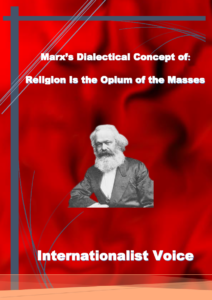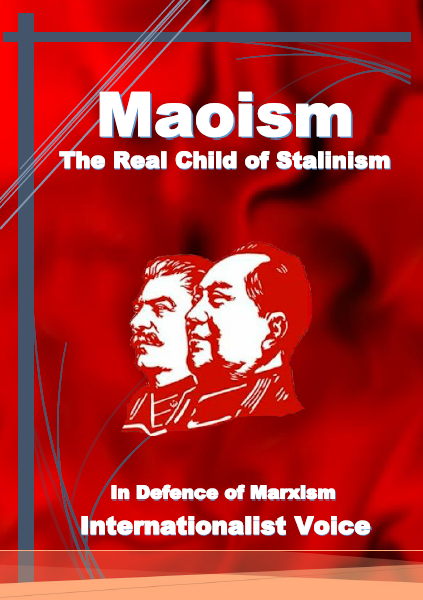Marx’s Dialectical Concept of: Religion Is the Opium of the Masses
Apart from its other forms, ideology shows itself in a rougher and harsher one in the peripheral countries of capitalism compared to the metropolitan version, while in the latter it takes on an acceptable and popular formation. In peripheral capitalism, especially in the Middle East, religion as the ideology of the ruling class and its role in influencing the lives of citizens, as well as the spread of Islamism to secular Europe, increasingly raise the issue of religion in public opinion.
“Religion is the opium of the masses” is one of Marx’s most profound, fundamental descriptions of religion. Unfortunately, this dialectical description has been distorted by the right and left tendencies of capital Warped interpretations of it have been presented and it has been emptied of its meaning. They infer that what Marx meant by “religion is the opium of the masses” is that religion is an opium which causes the masses to become anaesthetized and fall into lethargy. At that time, they ask, how are all these riots, revolts, uprisings, etc., that have taken place in the name of religion with its identity and set society in motion justified?
The same question was raised by one of the ideologues of the Islamic bourgeoisie who has been converted to the left wing of capital for some time. The same ideologue, with regard to the ideological superstructure of the Islamic bourgeoisie, which has created a real hell on earth for the working class, questioned whether Marx recognized Shiite principles of justice, while believing that religion is the opium of the working class? He wrote:
“The rise of Marxism, which claimed religion as the opium of the working class, saying that ‘In the event of a radical change in productive relations and the abolition of capitalist exploitation, religion will disappear’, in terms of credibility, it is a kind of historical reaction to theocratic governments. Here, without going into the context of this process, it is not too far-fetched to ask whether Karl Marx was acquainted with the fundamental ideas of Islamic civilization and, in particular, Shiite principles of justice; and, instead of dealing with medieval priests, whether he would have argued with a philosopher like Mullah Hadi Sabzevari to insist that religion is the ‘opium of the masses’ and a barrier to historical progress, and justify ‘bourgeois-proletarian’ tyrannical relations?”[1]
Contrary to the statements of such doctors, professors, clerics, etc., Marx was aware that throughout the history of class societies, there have been many rebellions with a religious ideology and with the flag of religion, and a very long list of them can be presented. First of all, it should be explained and made clear to these doctors, professors, etc., that opium does not only refer to narcotics, but also means that its use provides a type of mental peace, a kind of false happiness and satisfaction.
Marx’s idea was not that religion makes the masses lazy and lethargic, but he believed that a class society causes people to suffer due to exploitation, poverty, oppression, humiliation, etc., and seek some kind of false peace and imaginary satisfaction to forget their daily suffering in order to prepare themselves for the next day’s exploitation. They find relief by resorting to religion and reach mania without taking the time to think about the factors that caused their misery and without finding the opportunity to think that it is possible to build another world. To better understand Marx’s meaning, one should refer to his philosophical writings, especially “Theses on Feuerbach” and A Contribution to the Critique of Hegel’s Philosophy of Right.
“The abolition of religion as the illusory happiness of the people is the demand for their real happiness. To call on them to give up their illusions about their condition is to call on them to give up a condition that requires illusions. The criticism of religion is, therefore, in embryo, the criticism of that vale of tears of which religion is the halo.
Criticism has plucked the imaginary flowers on the chain not in order that man shall continue to bear that chain without fantasy or consolation, but so that he shall throw off the chain and pluck the living flower. The criticism of religion disillusions man, so that he will think, act, and fashion his reality like a man who has discarded his illusions and regained his senses, so that he will move around himself as his own true Sun. Religion is only the illusory Sun which revolves around man as long as he does not revolve around himself.”[2]
The class that owns the means of production, in other words, the one that is the dominant material force of the society, is able to create ideologies. An ideology is a kind of false and upside-down consciousness of the universe and, accordingly, it is the cause of human alienation. Religion is a type of ideology, and nationalism, bourgeois democracy, sports in capitalist society, etc., which appear in other forms do not create that imaginary peace or mania in the workers any less than religion. Are sports, nationalism, etc., less attractive to workers and do the ruling powers not use them as much as religion for their legitimacy as well as to poison the workers?
The struggle of bourgeois materialism and the left wing of capital with religion, including even the reference to Marx’s statement “religion is the opium of the masses”, can be traced to the Critique of Hegel’s Philosophy and has nothing to do with historical materialism. The horizon of such a struggle only considers bourgeois secularism and replaces the ideology of bourgeois democracy with religious ideology. From the perspective of historical materialism as well as Marx (after Feuerbach’s criticism), the criticism and understanding of religious beliefs are not enough to destroy it, but a change in the social and economic structure is a prerequisite for the destruction and rejection of religion. Feuerbach was one of the young Hegelians who was strongly against religion and considered it to be the cause of human alienation, representing the materialism of his time. With the fourth thesis (of the “Theses on Feuerbach”), Marx criticizes Feuerbach, taunting him that he is not able to understand that people take refuge in the religious world from the problems of the real one:
“Feuerbach starts out from the fact of religious self-alienation, of the duplication of the world into a religious world and a secular one. His work consists in resolving the religious world into its secular basis.
But that the secular basis detaches itself from itself and establishes itself as an independent realm in the clouds can only be explained by the cleavages and self-contradictions within this secular basis. The latter must, therefore, in itself be both understood in its contradiction and revolutionized in practice. Thus, for instance, after the earthly family is discovered to be the secret of the holy family, the former must then itself be destroyed in theory and in practice.”
Marx’s conclusion and criticism of religion was that as long as exploitation, oppression, or in other words the class society which is the basis of its existence are not destroyed, religion will not be eradicated either. Marx believed that religion will lose its existential necessity when the social classes are dismantled, like the state, and as long as the society is a class one, religion cannot be ended by suppressing it, but its material background must be demolished. In A Contribution to the Critique of Hegel’s Philosophy of Right, Marx writes:
“Man makes religion, religion does not make man. Religion is, indeed, the self-consciousness and self-esteem of man who has either not yet won through to himself, or has already lost himself again. But man is no abstract being squatting outside the world. Man is the world of man – state, society. This state and this society produce religion, which is an inverted consciousness of the world, because they are an inverted world. Religion is the general theory of this world, its encyclopaedic compendium, its logic in popular form, its spiritual point d’honneur, its enthusiasm, its moral sanction, its solemn complement, and its universal basis of consolation and justification. It is the fantastic realization of the human essence since the human essence has not acquired any true reality. The struggle against religion is, therefore, indirectly the struggle against that world whose spiritual aroma is religion.
Religious suffering is, at one and the same time, the expression of real suffering and a protest against real suffering. Religion is the sigh of the oppressed creature, the heart of a heartless world, and the soul of soulless conditions. It is the opium of the people.
…
It is, therefore, the task of history, once the other-world of truth has vanished, to establish the truth of this world. It is the immediate task of philosophy, which is in the service of history, to unmask self-estrangement in its unholy forms once the holy form of human self-estrangement has been unmasked. Thus, the criticism of Heaven turns into the criticism of Earth, the criticism of religion into the criticism of law, and the criticism of theology into the criticism of politics.”
Ideology is a tool in the hands of the ruling class to destroy workers and continue the brutality of capitalism. This ideology takes different forms depending on the necessity and needs of the society. If in some societies, religion plays an important part in the mania of workers, in metropolitan capitalism, bourgeois democracy, nationalism, sports, etc., have a more destructive role than religion in the destruction and mania of workers. The only real way to fight any ideology, including religion, is through class struggle, and Lenin rightly emphasizes this:
“Only the class struggle of the working masses – which draws the broadest sections of the proletariat comprehensively into revolutionary and socially conscious practice, will be able to really save the oppressed masses from the yoke of religion… The struggle against religion should not be reduced to abstract propaganda – Ideologically limited and exclusive, but it should be related to the specific practice of the class movement whose purpose is to destroy the roots of religion”[3].
It is during the class struggle that the workers’ false illusions of religion, bourgeois democracy, nationalism, etc., will disintegrate. In such a situation, religion, sports competitions, etc., will no longer create mania in the workers, who will not look for imaginary peace but for the reasons of their own wage slavery. It is during and due to the class struggle that the working masses will gradually free themselves from the yoke of any ideology, including religion, by achieving class identity. It is only in the socialist society that the existence of any ideology, including religion, will be destroyed.
M. Jahangiry
27 October 2023
[1]http://ensani.ir/file/download/article/20101210171942-1075.pdf
[2] A Contribution to the Critique of Hegel’s Philosophy of Right – Marx
[3] Religion, according to Lenin.














